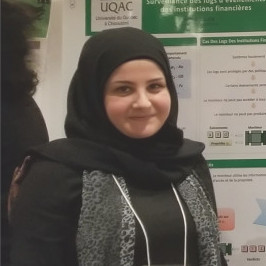We are pleased to announce that Rania Taleb, a PhD candidate under the supervision of LIF members Prs. Raphaël Khoury and Sylvain Hallé, has earned the Best Paper Award of the 9th Conference on Formal Methods in Software Engineering (FormaliSE 2021). The event was co-located with the International Conference on Software Engineering (ICSE), which was held virtually in May 2021.
Her paper, entitled Runtime Verification Under Access Restrictions, focuses on the problem of runtime verification, which consists of observing the execution of a software system and ensuring in real time that some constraints over the sequence of observed events are always satisfied. Her work defines a logical framework that permits runtime verification to take place when the observer (also called the “monitor”) has incomplete or uncertain information about the underlying sequence of events. Experiments on various scenarios show that the proposed approach can account for various types of data degradation and access limitations, provides a tighter verdict than existing works in some cases, and preserves scalable performance of the model.
Congratulations Rania –and apologies for this belated announcement!




Recent Comments